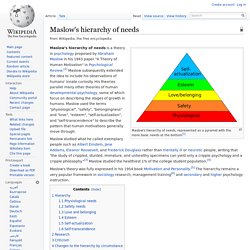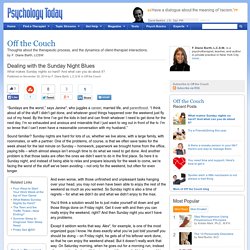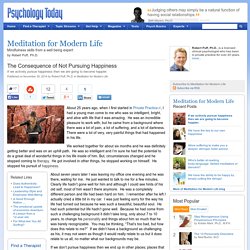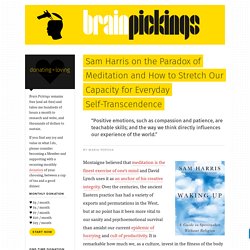

M.facebook. Photo.

Can a Pill Make You Smarter? The Brave New World of Smart Drugs. Photo Credit: Shutterstock.com In the 2011 movie Limitless, our loser-turned-hero Bradley Cooper takes a pill, writes a novel in a few days, becomes an investment tycoon, and performs other tricks of mental derring-do.

And of course at the end of the movie (spoiler alert!) , he gets the girl. Moving On and Letting Go. The Fastest Way to Feel Confident About Your Hopes and Plans.
Stress. Willpower & Motivation. Introversion. Sexual Psychology. Love & Relationships. How to Complain So People Will Listen. Rethinking the Placebo Effect: How Our Minds Actually Affect Our Bodies. Four Ways to Click: Rewire Your Brain for Stronger, More Rewarding Relationships. Cognitive Benefits of Playing Video Games. 8 Negative Attitudes of Chronically Unhappy People. Status: A More Accurate Way of Understanding Self-Esteem.
How to have more insights. The Problem With Being Gifted. Political Positions. One Exercise Sure to Make You Feel Better About Yourself. Antonio Guillem/Shutterstock I have been treating patients using cognitive therapies for almost 15 years, and one of the most successful exercises I have ever seen work to help them re-engage their sense of well-being is so simple that each and every time I convince someone to do it, I am still remarkably struck by how effective it is.

Before I share this exercise with you, I want you to know that the difficult part is not doing the activity. It is making yourself believe that the activity will have enough benefit that you will put forth the actual effort to do it, and experience the results. Often when I give this assignment to patients, they come back for two or three weeks afterward, still not having tried it. OK, so what is the exercise? Keep a pad of paper next to your bed and every night before you go to sleep, write down three things you liked about yourself that day.In the morning, read the list before you get out of bed.Do this everyday for 30 days. 9 Ways Your Old Programming May Be Holding You Hostage. "Old programming" is one way to think about decisions you made as a child to better adapt to a conditionally accepting family.

After all, when you’re highly dependent on your caretakers for comfort, guidance, and support, what could be more essential than feeling securely bonded to them? Obviously, when you’re young, you can’t function autonomously. Maslow's hierarchy of needs. Maslow's hierarchy of needs, represented as a pyramid with the more basic needs at the bottom[1] Maslow's hierarchy of needs is a theory in psychology proposed by Abraham Maslow in his 1943 paper "A Theory of Human Motivation" in Psychological Review.[2] Maslow subsequently extended the idea to include his observations of humans' innate curiosity.

His theories parallel many other theories of human developmental psychology, some of which focus on describing the stages of growth in humans. Maslow used the terms "physiological", "safety", "belongingness" and "love", "esteem", "self-actualization", and "self-transcendence" to describe the pattern that human motivations generally move through. Maslow's theory was fully expressed in his 1954 book Motivation and Personality.[5] The hierarchy remains a very popular framework in sociology research, management training[6] and secondary and higher psychology instruction. Maslow's Hierarchy of Needs. Dealing with the Sunday Night Blues. “Sundays are the worst,” says Janine*, who juggles a career, married life, and parenthood.

“I think about all of the stuff I didn’t get done, and whatever good things happened over the weekend just fly out of my head. By the time I’ve got the kids in bed and can finish whatever I need to get done for the next day, I’m so exhausted and anxious and miserable that I just want to veg out in front of the tv. I’m so tense that I can’t even have a reasonable conversation with my husband.” Sound familiar? Sunday nights are hard for lots of us, whether we live alone, with a large family, with roommates, or with a partner.
The Consequence of Not Pursuing Happiness. About 25 years ago, when I first started in Private Practice, I had a young man come to me who was so intelligent, bright, and alive with life that it was amazing.

He was an incredible pleasure to work with; but he came from a background where there was a lot of pain, a lot of suffering, and a lot of darkness. There were a lot of very, very painful things that had happened in his life. We worked together for about six months and he was definitely getting better and was on an uphill path. He was so intelligent and I’m sure he had the potential to do a great deal of wonderful things in his life inside of him.
Women Are Sort Of More Tentative Than Men, Aren't They? ScienceDaily (Aug. 26, 2009) — Women hedge, issue disclaimers and ask questions when they communicate, language features that can suggest uncertainty, lack of confidence and low status.

But men do the same, according to new research from the University of California, Davis. "It's a stereotype that men are direct while women are tentative. I debunk that stereotype," said Nicholas Palomares, assistant professor of communication at UC Davis. Palomares reports his findings in "Women Are Sort of More Tentative Than Men, Aren't They? ," an article in the August issue of the journal . "I found that women are more tentative than men sometimes, and men are more tentative than women sometimes," Palomares said. In his study, Palomares asked nearly 300 UC Davis undergraduates -- about half of them female and half male -- to write e-mails explaining how to change a flat tire or buy make-up, among other gender-stereotyped and gender-neutral topics. Illusionist Derren Brown on the Psychology of Gullibility.
Picture worth a thousand words: New research links visual cues to male sexual memory. ScienceDaily (Oct. 12, 2010) — A new study published in finds that college-aged men are very likely to remember a woman's initial sexual interest (attraction or rejection), especially when the woman in question is thought to be attractive, is dressed more provocatively, and expresses positive sexual interest.

In the study the men were shown full-body photographs of college-aged women who expressed cues of sexual interest or rejection. The participating males represented mixed sexual histories, and a capacity for varying degrees of sexually aggressive behavior. The ability to discriminate accurately between photos that the males had and had not seen previously indicated good memory for women's sexual interest. Throughout the study they were presented with previously viewed photos and new photos of the same women in which they communicated the opposite cue (e.g., rejection instead of sexual interest).
The above story is reprinted from materials provided by , via AlphaGalileo. #399: “But you oooowe me!” — entitlement rears its head again. {*style:<i>Thank you! Girl, Overworked, Avoids Weird, Awkward Yakking </i>*} Dear GOAWAY, Sam Harris on the Paradox of Meditation and How to Stretch Our Capacity for Everyday Self-Transcendence. Montaigne believed that meditation is the finest exercise of one’s mind and David Lynch uses it as an anchor of his creative integrity.

7 Essential Books on Music, Emotion, and the Brain. By Maria Popova What Freud has to do with auditory cheesecake, European opera and world peace. Last year, Horizon’s fascinating documentary on how music works was one of our most-liked pickings of 2010. But perhaps even more fascinating than the subject of how music works is the question of why it makes us feel the way it does. Today, we try to answer it with seven essential books that bridge music, emotion and cognition, peeling away at that tender intersection of where your brain ends and your soul begins.
What Translation Reveals about the Human Condition. The Hidden Brain: How Ocean Currents Explain Our Unconscious Social Biases. By Maria Popova. The Definitive Manifesto for Handling Haters: Anne Lamott on Priorities and How We Keep Ourselves Small by People-Pleasing. Does My Goldfish Know Who I Am? Scientists and Writers Answer Little Kids’ Big Questions about How Life Works. By Maria Popova. The Benjamin Franklin Effect: The Surprising Psychology of How to Handle Haters. You Are Not So Smart: A Field Guide to the Brain’s Guile. Fighting Loneliness With Cuddle Parties. Streams of Consciousness, Scientific American Blog Network. The views expressed are those of the author and are not necessarily those of Scientific American.
Editor’s note: Brain Basics from Scientific American Mind is a series of short video primers on the brain and how we feel, think and act. Below is a synopsis of the ninth video in the series written by a guest on this blog, Roni Jacobson, a science journalist based in New York City. Walking Meditation: the Perfect ten Minute Willpower Boost. Sleep, Thinking, and Aging. » Shinrin-yoku: Forest Healing. Feeling Good: The New Mood Therapy: David D. Burns: 9780380810338: Amazon.com: Books. Smile Your Way Out of Stress? Creativity and Sensory Gating. Why It’s Hard to Let Go of Clutter. What’s Better Than Gratitude? How to Keep Bad Moods From Taking You Over. Photo by r.f.m II Well, it happens sometimes. I find myself in a lousy mood. Hard to say where it started, but it certainly has something to do with not getting much sleep Saturday night. Just How Dark Is Your Dark Side? Magog2/Wikimedia Commons.